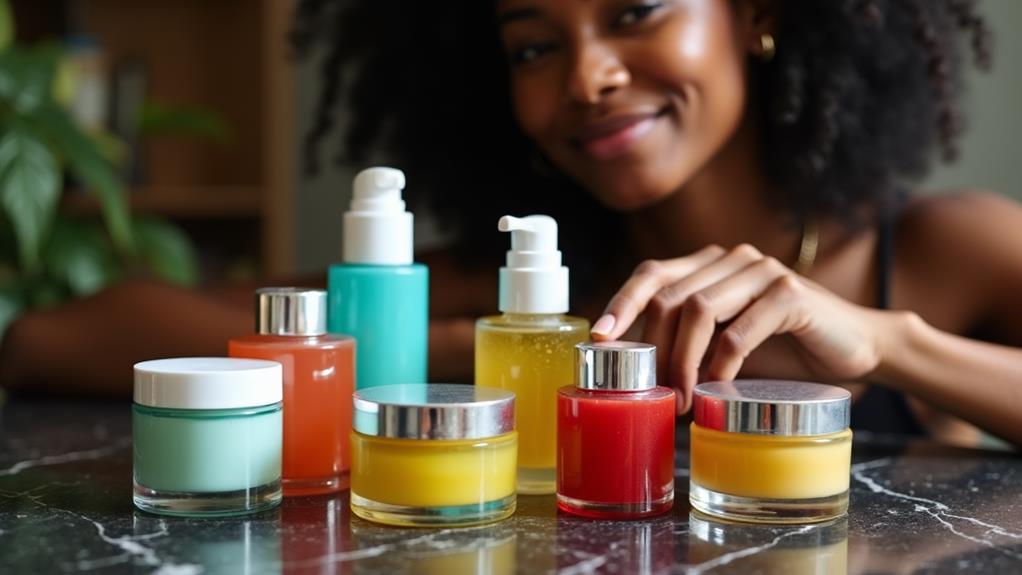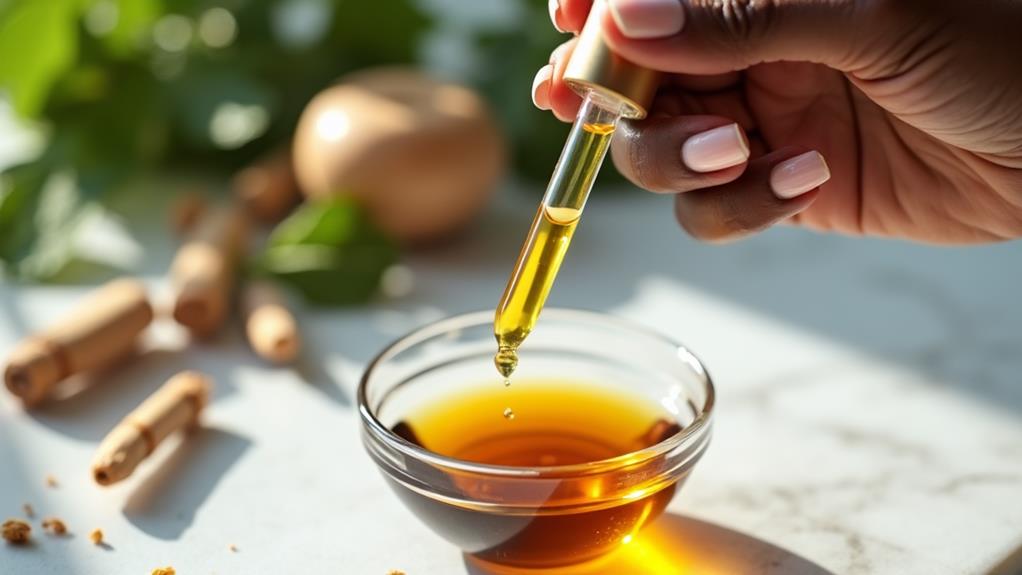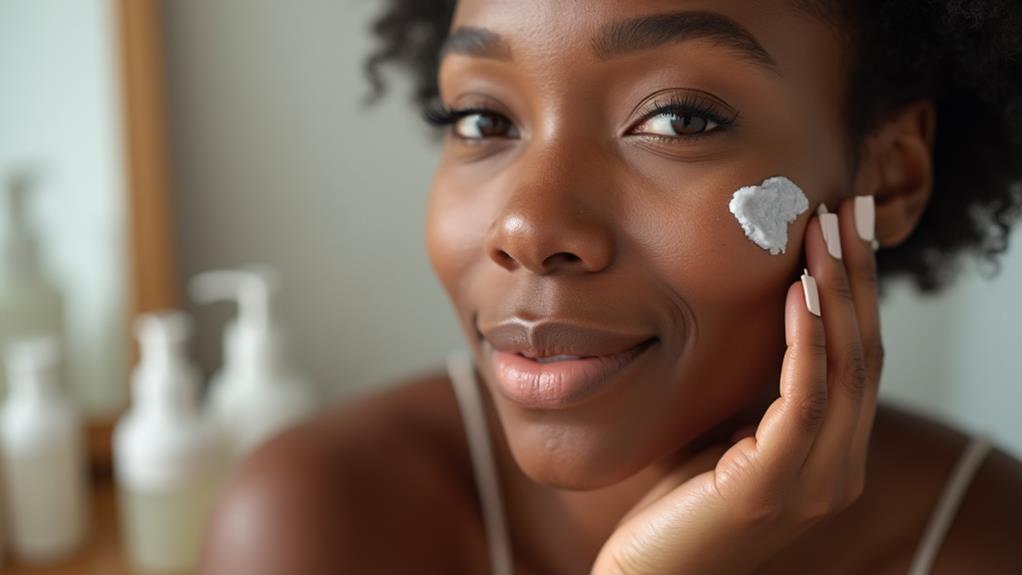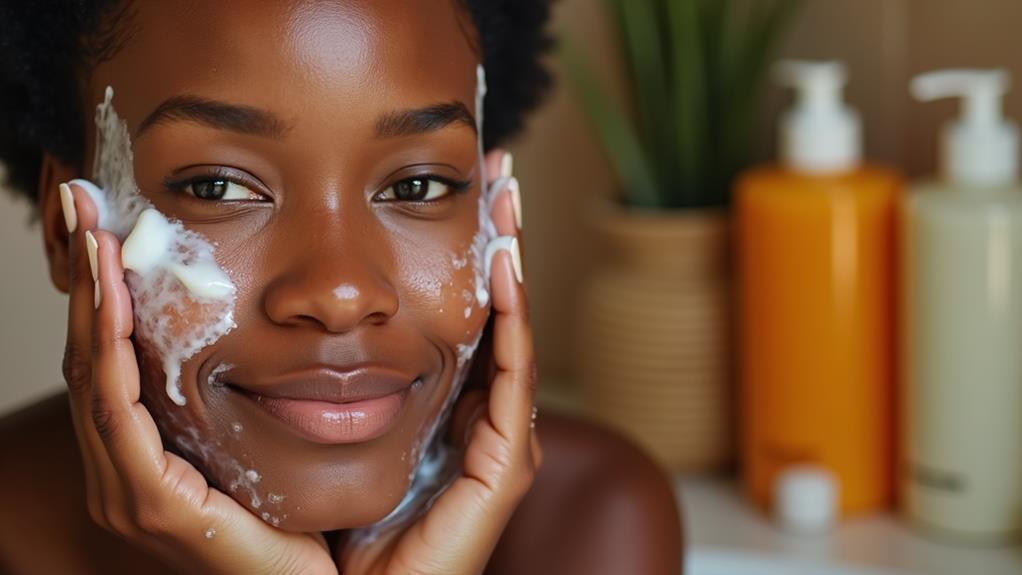Did you know that over 50% of individuals with melanin-rich skin experience acne at some point in their lives? If you're among this group, you've likely encountered challenges in finding suitable skincare products. While many ingredients promise clear skin, some can actually worsen acne and cause further complications for those with darker complexions. Understanding which components to avoid is essential for maintaining healthy, blemish-free skin. By learning about these potentially harmful ingredients, you'll be better equipped to make informed decisions about your skincare routine and achieve the clear, radiant complexion you desire.
Key Takeaways
- Avoid alcohol-based products that strip natural oils and exacerbate hyperpigmentation in melanin-rich skin.
- Steer clear of harsh physical exfoliants that can cause micro-tears and post-inflammatory hyperpigmentation.
- Eliminate comedogenic oils like coconut oil and cocoa butter, which clog pores and lead to breakouts.
- Skip synthetic fragrances that can irritate skin and trigger acne flare-ups.
- Avoid high-concentration benzoyl peroxide (above 2.5%) and hydroquinone, which can cause severe side effects for melanin-rich skin.
Alcohol-Based Products

Frequently, alcohol-based products are touted as quick fixes for oily or acne-prone skin. However, if you have melanin-rich skin, you'll want to steer clear of these ingredients. While alcohol can temporarily reduce oil and create a matte appearance, it often does more harm than good in the long run.
Alcohol-based products can strip your skin of its natural oils, leading to increased dryness and irritation. This disrupts your skin's protective barrier, making it more susceptible to bacteria and environmental stressors. For melanin-rich skin, which is already prone to hyperpigmentation, this can exacerbate dark spots and uneven skin tone.
Common alcohols to avoid include ethanol, isopropyl alcohol, and denatured alcohol. These ingredients can be particularly harsh on your skin, causing inflammation and potentially triggering more breakouts.
Instead, look for gentler, hydrating alternatives that won't compromise your skin's balance. If you're struggling with acne, opt for products containing salicylic acid, benzoyl peroxide, or niacinamide. These ingredients effectively target acne without the harsh, drying effects of alcohol.
Harsh Physical Exfoliants
In spite of their popularity, harsh physical exfoliants can be detrimental to acne-prone skin, especially for those with melanin-rich complexions. These products often contain abrasive particles like crushed walnut shells, sugar, or salt that can create micro-tears in your skin. For melanin-rich skin, this damage can lead to post-inflammatory hyperpigmentation, exacerbating existing skin concerns.
Instead of harsh scrubs, opt for gentler chemical exfoliants like alpha-hydroxy acids (AHAs) or beta-hydroxy acids (BHAs). These ingredients effectively remove dead skin cells without causing physical trauma. If you're set on using a physical exfoliant, choose products with smooth, round beads or very fine particles.
When exfoliating acne-prone skin, less is more. Over-exfoliation can strip your skin of its natural oils, leading to increased oil production and potentially more breakouts.
Limit exfoliation to once or twice a week, and always follow up with a moisturizer to maintain your skin's balance.
Comedogenic Oils

While many oils can nourish your skin, comedogenic oils pose a significant risk for those prone to acne. These oils have a tendency to clog pores, leading to breakouts and exacerbating existing acne.
You'll want to steer clear of highly comedogenic oils like coconut oil, cocoa butter, and avocado oil, which can be particularly problematic for melanin-rich skin.
Instead, opt for non-comedogenic alternatives that won't clog your pores. Look for products containing oils like jojoba, grapeseed, or rosehip, which are less likely to cause breakouts.
When checking product labels, be wary of ingredients like mineral oil, lanolin, and petrolatum, as these can also contribute to clogged pores.
It's important to note that everyone's skin reacts differently, so what works for one person may not work for another. You might need to experiment to find the right balance for your skin.
If you're unsure about a product, perform a patch test on a small area of your face before applying it more broadly.
Synthetic Fragrances
Although synthetic fragrances can make products smell appealing, they're often a major culprit behind skin irritation and acne flare-ups. For those with acne-prone, melanin-rich skin, these artificial scents can be particularly problematic.
They're typically composed of complex chemical mixtures that can clog pores, disrupt your skin's natural barrier, and trigger inflammation.
When shopping for skincare products, you'll want to steer clear of items listing "fragrance" or "parfum" as ingredients. These terms can mask hundreds of undisclosed chemicals, some of which may be harmful to your skin.
Instead, opt for fragrance-free or unscented products. Be aware that "unscented" doesn't always mean fragrance-free; some unscented products contain masking fragrances to neutralize odors.
If you enjoy scented products, consider those with natural essential oils. However, use caution, as some essential oils can also irritate sensitive skin.
Always patch test new products before applying them to your face. By avoiding synthetic fragrances, you're taking a significant step in protecting your melanin-rich, acne-prone skin from unnecessary irritation and breakouts.
High-Concentration Benzoyl Peroxide

Despite its popularity as an acne-fighting ingredient, high-concentration benzoyl peroxide can be too harsh for melanin-rich, acne-prone skin. While it's effective at killing acne-causing bacteria, concentrations above 2.5% can lead to excessive dryness, irritation, and even hyperpigmentation in darker skin tones.
When you're shopping for skincare products, be wary of over-the-counter treatments containing 5% or 10% benzoyl peroxide. These high concentrations can strip your skin of its natural oils, leading to increased sensitivity and potential damage to your skin barrier. This can exacerbate acne and cause post-inflammatory hyperpigmentation, which is more pronounced in melanin-rich skin.
Instead, opt for lower concentrations of benzoyl peroxide, ideally 2.5% or less. These are just as effective at treating acne but with a lower risk of irritation.
If you're using a product with benzoyl peroxide, introduce it gradually into your skincare routine and monitor your skin's reaction closely. Always pair it with a good moisturizer to counteract its drying effects.
If you experience any persistent redness, peeling, or darkening of the skin, discontinue use and consult a dermatologist experienced in treating melanin-rich skin.
Hydroquinone
Hydroquinone, once hailed as a miracle solution for hyperpigmentation, is now a controversial ingredient for acne-prone, melanin-rich skin. While it's effective at lightening dark spots, it can cause severe side effects, especially for those with deeper skin tones.
You'll want to steer clear of hydroquinone if you have acne-prone, melanin-rich skin. This ingredient works by inhibiting melanin production, which can lead to uneven skin tone and increased sensitivity to UV rays. For acne-prone skin, this heightened sensitivity can exacerbate breakouts and inflammation.
Moreover, long-term use of hydroquinone can result in ochronosis, a condition that ironically causes skin darkening and discoloration. This risk is particularly high for individuals with darker skin tones. Additionally, hydroquinone can cause irritation, redness, and dryness, further compromising your skin's barrier function.
Instead of hydroquinone, opt for gentler, natural alternatives like kojic acid, vitamin C, or niacinamide to address hyperpigmentation. These ingredients can help even out your skin tone without the potential risks associated with hydroquinone.
Always consult with a dermatologist before incorporating new products into your skincare routine, especially if you have acne-prone, melanin-rich skin.
Sodium Lauryl Sulfate

Sodium Lauryl Sulfate (SLS) is another ingredient you'll want to avoid if you have acne-prone skin. This common surfactant is found in many cleansing products, including face washes, shampoos, and toothpaste. While SLS is effective at removing dirt and oil, it can be too harsh for sensitive or acne-prone skin, especially for those with deeper skin tones.
SLS works by stripping away oils from your skin's surface, which might seem beneficial for acne. However, this aggressive cleansing can actually trigger your skin to produce more oil to compensate, potentially worsening acne.
It can also disrupt your skin's natural barrier function, making it more susceptible to irritation and bacterial invasion. For melanin-rich skin, which is often more prone to post-inflammatory hyperpigmentation, the irritation caused by SLS can lead to dark spots and uneven skin tone.
To protect your skin, look for gentler, SLS-free cleansers that maintain your skin's natural balance. Ingredients like glycerin, ceramides, and hyaluronic acid can provide effective cleansing without the harsh effects of SLS.
Always check product labels and opt for formulations specifically designed for acne-prone, sensitive skin.


